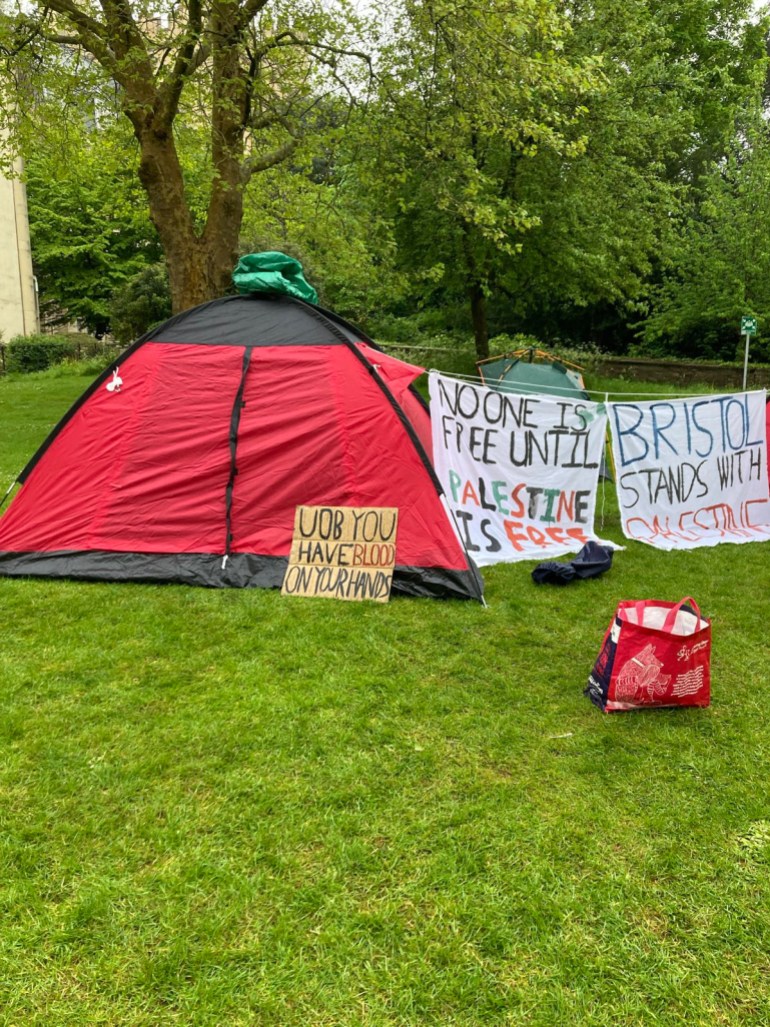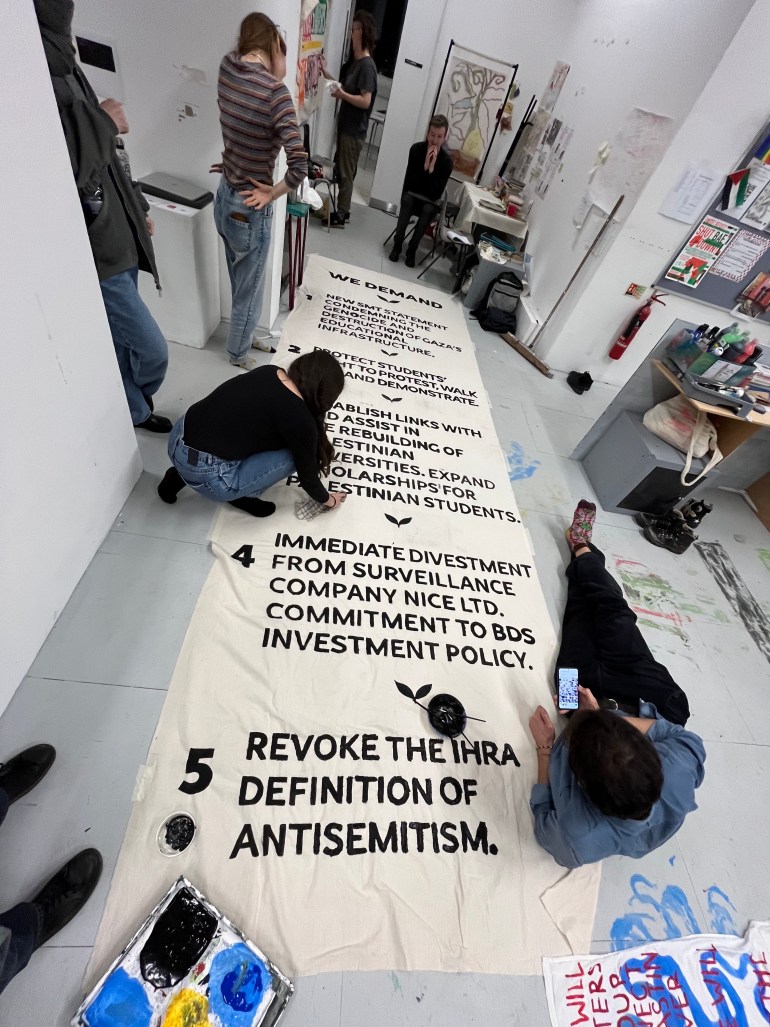London, England – At 3am last Wednesday, as the rain poured down, pro-Palestine students at Bristol University set up an encampment opposite a study centre on campus.
Eugenia and five other student activists who had met at previous protests put four tents together. But despite the cold, more sprung up over the next few nights.
“It’s now grown to at least 20 tents, with loads of people rotating in and out, usually about 30 [people] at the camp during the day. But it’s sometimes more if we have a specific event on,” Eugenia, an organiser with the Bristol for Palestine group, told Al Jazeera.
“Staff and students stopping by to express support and ask how they can get involved is also so encouraging,” said Eugenia. “The movement to divest and fight for a free Palestine is so much bigger than the university executives like to pretend.”
The encampment has communal supplies, such as food, face masks, COVID-19 tests, and books on Palestinian history. There are also flyers explaining protester rights as well as leaflets on how Bristol is “complicit in the genocide”.
At the heart of their demands, the students are calling for their university to cut ties with companies that are contributing to Israel’s war efforts, including BAE Systems.
The British defence firm partially manufactures F-35 fighter jets that have been used by the Israeli military in Gaza.
“My university has millions of pounds in partnerships with companies that arm Israel. I do not think it is complicated to think that an institution’s complicity in violent settler-colonialism, apartheid, ethnic cleansing and genocide is bad,” said Eugenia, who added that they have been in contact with their peers at the University of Warwick in England and those protesting in the United States and Canada.
University security workers have asked them to leave but they have not been threatened with any disciplinary action.
“Although, we wonder if this will change after [Prime Minister] Rishi Sunak’s meeting with UK vice-chancellors.”
 Students at the University of Bristol have called on their school to divest from companies linked to Israel’s military [Courtesy of Eugenia, Bristol for Palestine]
Students at the University of Bristol have called on their school to divest from companies linked to Israel’s military [Courtesy of Eugenia, Bristol for Palestine]British Prime Minister Rishi Sunak told his cabinet on Tuesday there had been an “unacceptable rise in anti-Semitism” on campuses across the United Kingdom.
He is expected to meet university bosses on Thursday.
Earlier this month, the Union of Jewish Students, which says it represents 9,000 people in the UK and Ireland, said pro-Palestine encampments “create a hostile and toxic atmosphere on campus for Jewish students”.
Thousands of students across Britain have joined the global student-led protests against Israel’s latest and deadliest war on the Gaza Strip, which has killed about 35,000 people in just seven months. The historic Israel-Palestine conflict escalated after Hamas, which governs the Strip, attacked southern Israel. During its assault, 1,139 people were killed and hundreds were taken captive.
Britain has not witnessed the kind of violent scenes on campuses the US has, including heavy police crackdowns and clashes between protesters and counter-protesters.
The British students say their rallies are peaceful and are joined by many Jewish undergraduates and scholars.
On Tuesday, the Jewish Society at the School of Oriental and African Studies in London said it stood “shoulder to shoulder” with those rallying for Gaza.
Sunak’s announcement came after the universities of Oxford and Cambridge, which have long taught the British elite, joined the protests on Monday. The majority of British prime ministers have studied at Oxford, including Sunak and his four predecessors, while several others have graduated from Cambridge.
At the time of writing, neither the University of Bristol nor the University of Cambridge had responded to Al Jazeera’s request for comment.
The Cambridge for Palestine group said Trinity College, Cambridge University’s second-largest college “has invested millions in companies directly supporting Israel’s genocide”.
Middle East Eye recently reported Trinity invested more than 60,000 pounds ($75,000) in Elbit Systems, an Israel-based international military technology company and defence contractor, and millions in Caterpillar, a US-based heavy equipment company which supplies the Israeli army with bulldozers. Other companies reportedly include General Electric, Toyota, Rolls-Royce, Barclays Bank, and L3Harris Technologies.
“Our solidarity is particularly important now given that these decades of ethnic cleansing have culminated in Israel’s genocide of Palestinians, including the destruction of every university in Gaza.”
‘It starts with students and spreads from there’
In some cases, universities have reached deals with their dissenting students.
In Ireland, for instance, Trinity College Dublin agreed to divest from Israeli companies linked to illegal settlements after just a few days of student protests.
On Friday, Goldsmiths, University of London conceded to the five demands of activists who have held protests throughout the war in Gaza.
Action led by the Goldsmiths for Palestine group has resulted in scholarships for Palestinian students and a commitment towards an ethical investment policy. A lecture hall will also be renamed after veteran Al Jazeera journalist Shireen Abu Akleh, who was killed by Israeli forces in the occupied West Bank in 2022.
Leonie Fleischmann, a senior lecturer in International Politics and Human Rights at City, University in London, said that as some students achieve their goals and more protests erupt, the “momentum” must be maintained.
“If we’re talking about the role of protests and pressure, they need to go beyond against what’s happening in Gaza (right now) to what’s next. So it’s a watch this space, in terms of the role of the protests on the course of the Israeli-Palestinian conflict,” she said.
“If we look at the anti-apartheid movement (in South Africa) and the Vietnam War, students across the globe were significant in creating change and influencing their governments to hold other governments to account.”
Danna, a student organiser at Goldsmiths, told Al Jazeera that negotiations with university management were “frustrating”.
“On the first meeting they had with us, they were kind of complimenting us and saying that they thought it was wonderful that we were expressing ourselves and it was very ‘Goldsmiths-y’ of us,” she said. “Later on, we found out through staff members that at the same time, they had been saying in meetings behind closed doors they’d been considering calling police on us.”
 Students at Goldsmiths University are pictured making a banner listing their demands [Courtesy of Goldsmiths for Palestine]
Students at Goldsmiths University are pictured making a banner listing their demands [Courtesy of Goldsmiths for Palestine]She believes that their demands were ultimately accepted because of the growing global student movement.
“It’s been the case time and time again throughout history that it starts with students and spreads from there.
“We definitely feel in solidarity with the students in the US and everywhere else. And I think for us all to be centring Palestinians right now is super important.”

 8 months ago
27
8 months ago
27









